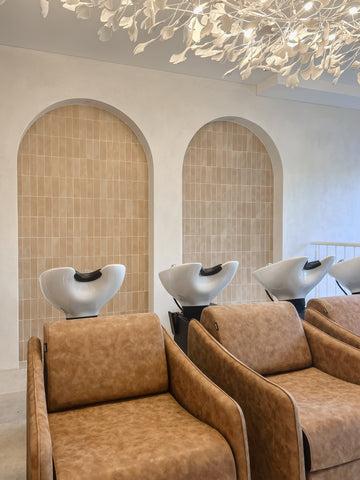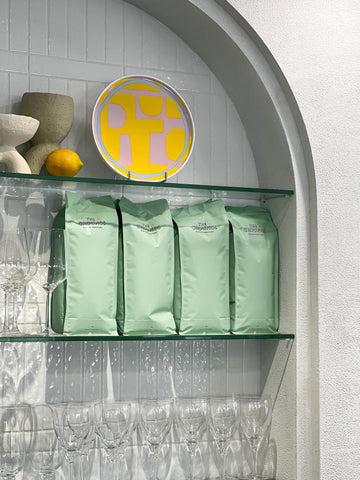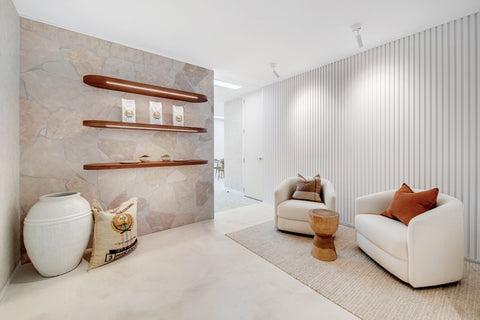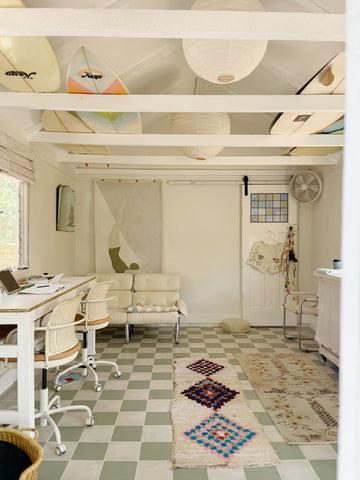Innovative Tile Applications for Commercial Design
Every business is different, so how you use tiles in these spaces will also be different. If you’re designing a shopfront, office or anything in between, we’ll show you how to use tiles to make your commercial space be both functional and look great. We’ll also cover other important things to consider when choosing tiles for your project.
The impact of tile design on commercial spaces
Why choose tiles for your next commercial project? Here’s how they can work in your favour:
Aesthetics
Plain and simple: tiles look good. They can turn dull or dirty floors, walls and other surfaces into something special. This has flow-on effects — a nicer space is nicer to work in and can attract more people into your space.
Functionality
Tiles aren’t just a pretty face — they’re tough and can handle lots of foot traffic and heavy use. Some tiles also have grip, which can make a space that gets wet less of a slip hazard. Tiles are also longer-lasting than many other surfaces and easy to clean.
Brand identity
Chances are you’ve got a brand colour palette; tiles in your colours reinforce your brand. You can also use mosaic tiles to create unique patterns or your company logo to reinforce your brand.
Property value
Tiles can increase the value of properties. They’re durable, so you’ll need fewer repairs which affects the property's long-term value. Also, updating outdated spaces with new tiles can also improve a property's market appeal.
6 tile considerations for commercial projects
Choosing tiles for commercial spaces may need a bit of thought. Here are the main things you need to think about before committing to a tile:
1. Material
The tile you need will depend on your space, but one thing should apply across all businesses — durability. Porcelain and ceramic tiles are extremely durable and water-resistant, making them good for high-traffic areas.
2. Size and format
Tile size and layout can affect how people see your space. Large tiles have fewer grout lines, making a space feel more open. Small tiles and mosaics come with more design flexibility and look great on walls.
3. Colour and pattern
Colours and patterns can influence mood and behaviour in commercial spaces. Neutral colours are timeless and a non-distracting backdrop for work. Bold colours make a statement and can create different zones within a space. Patterns can direct foot traffic or create focal areas.
4. Longevity
Think about maintenance when choosing commercial tiles. Quality materials are a good start but also consider the quality of installation and grout. Darker grout is easier to keep clean in high-traffic areas.
5. Compliance
Your tiles need to meet commercial building codes and regulations. This includes slip resistance requirements, load-bearing capacities and other relevant standards for commercial spaces.
6. Budget
Balance quality and cost when selecting tiles for commercial projects. While it's tempting to cut costs, investing in higher-quality tiles often pays off in the long run through durability. Consider the total lifecycle cost of the tiles, not just the upfront price.
Tile applications in different commercial spaces
There are a hundred ways to use tiles in commercial spaces. We’ve taken a look at the most common commercial spaces and how tiles can be a part of their design.
Retail spaces

Retail environments should be inviting and practical. How you use tiles in these spaces will be different depending on your business type — a salon has different needs than a shopfront.
Some things, however, are consistent. Flooring, for example, should be able to handle constant foot traffic and be easy to clean. Wall tiles are more often used as accents, drawing attention to key areas or products.
In this hair salon, our Northbridge Peach Terracotta Look Subway Tile makes for a beautiful feature wall that catches customers' eyes.
Hospitality settings

Hotels, restaurants and bars use tiles to make cleanup easier and to create a nice vibe for guests. For hospitality floors, you need non-slip, easy-to-clean tiles. Make sure they have a high slip resistance rating and meet other safety requirements. The walls are more flexible — choose anything that works in your space.
In the café above, our Albert Park Full White Subway Tiles are a backdrop to some decorative-yet-practical shelves.
Office environments

Tiles aren’t just for shops and bars; they can also make an office space feel warm yet professional. At reception, wall tiles set the tone for visitors and clients. On the floors, large format tiles are easy to maintain and can make the office feel more polished.
This office uses our Clovelly Stone Look Crazy Paving Tiles on a feature wall; they make the space feel more grounded and organic.
Commercial mix-use spaces

Mix-use commercial spaces need versatile tiles. These areas sometimes combine retail, office and sometimes residential elements. It’s not uncommon to see a business operating out of a spare room or garage.
Choose tiles that suit the way you use your space — an artist has different needs than a desk worker. If you have customers, think about what they might want to see. Keep everyone happy with tiles that don’t scuff or stain easily.
In this creative studio, our Bronte Checkerboard Sage & White Tiles bring life to the space.
Healthcare facilities
Design in healthcare is well-regulated to make sure everything’s hygienic and safe. Tiles are the best pick for floors because they’re easy to sterilise and roll equipment on. On the walls, you can get creative with tiles to make the space feel more welcoming.
Need help choosing tiles for your commercial space?
Introducing TileCloud TRADE. Our program gives tradespeople and designers access to commercial-quality tiles at a trade discount. Builders, developers, architects, tilers, plumbers and interior designers can enjoy perks like dedicated support and competitive prices to make tile shopping easier.
Whether you're planning a retail space, updating an office or designing a studio, the right tiles can make all the difference.
Frequently asked questions (FAQs)
What's the best type of tile for high-traffic commercial areas?
For high-traffic commercial areas, porcelain tiles are often the best choice. They're extremely durable, resistant to wear and easy to maintain.
How do I choose tiles that will stay in style for a long time?
Classic designs and neutral colours never go out of style. If you want to incorporate trends, do so in smaller, easily replaceable areas rather than large, permanent installations.
Are there special considerations for choosing tiles for commercial bathrooms?
Yes, commercial bathroom tiles need to be water-resistant, easy to clean and slip-resistant. Make sure to choose tiles that meet commercial building codes for bathroom spaces. Porcelain tiles with a high slip rating are a good choice.
What's the difference between commercial and residential tiles?
In most situations, the tile itself is the same, but the application is different. However, some commercial tiles are more durable and have higher wear ratings than residential tiles.

Layla is a creative at heart, with an Advanced Diploma in Interior Design and being the Senior Marketing and Ecommerce Coordinator here at TileCloud she has a passion for staying up to date with the latest trends within the industry. Known for going down a rabbit hole on Pinterest and being a sucker for a good mood board to kick off any project.
